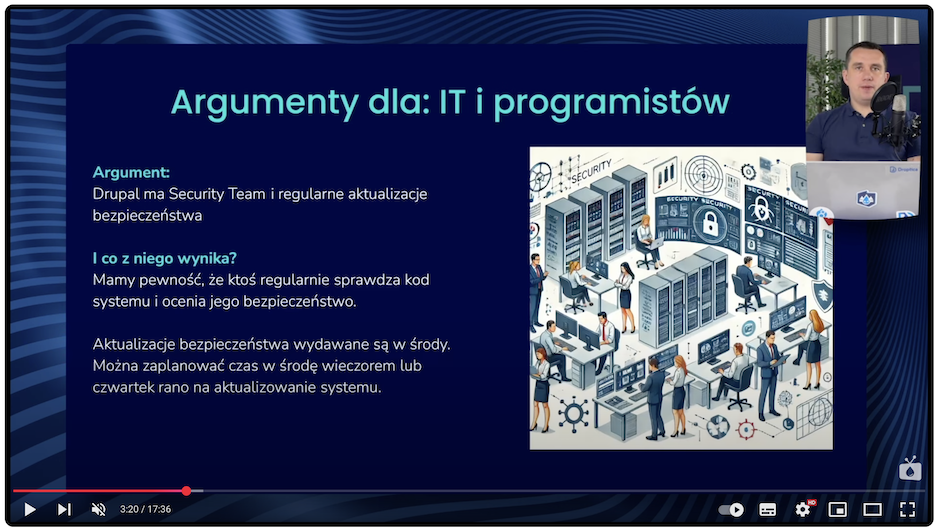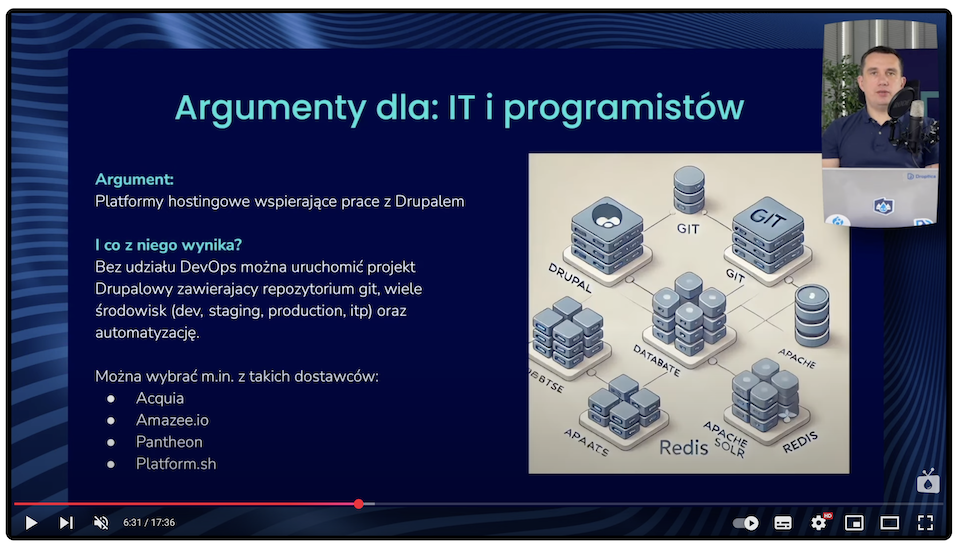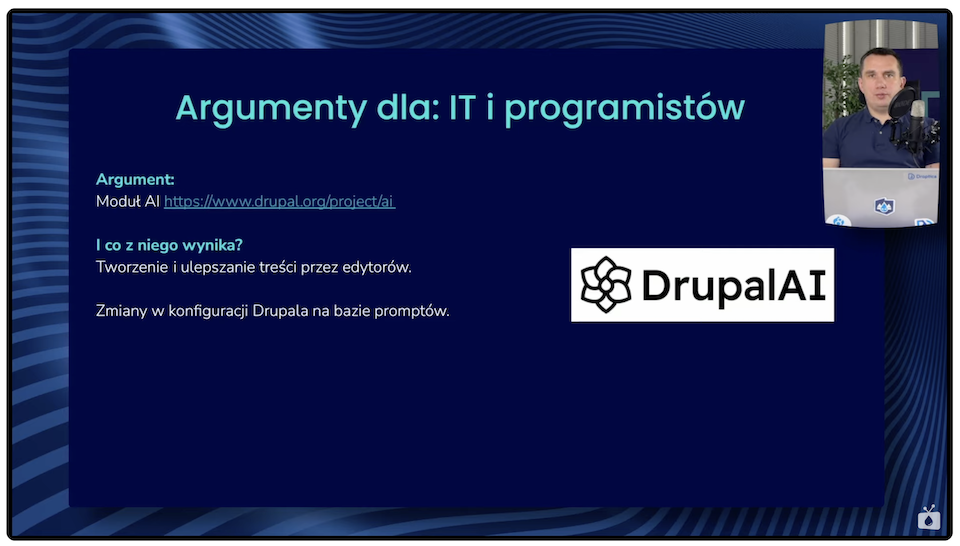
13 Reasons Why Drupal is the Best CMS for Developers and IT Teams
In our previous article, I described the arguments for Drupal for business and finance. I also showed what decision-making groups can influence an organization's choice of CMS. In this post, I’ll focus on the technology and software areas. Learn thirteen reasons why IT people and developers should consider implementing Drupal. I invite you to read the article or watch an episode of the “Nowoczesny Drupal” series.
What does IT mean in the context of this article?
In the following blog post, by "IT department" and "IT people," I mean all roles related to system architecture planning and integration between different tools in the company. I'm also referring to the specialists who ensure the business continuity and availability of applications (including during the implementation of new versions) and those responsible for security.
In different organizations, these may be individuals holding positions such as IT Director, CTO or Tech Lead. The nomenclature may vary, but they share a common responsibility for the technological foundation of the company.
In the rest of the article, I present thirteen of the most critical arguments for choosing Drupal just from the perspective of these roles - both in terms of day-to-day project work and the company's long-term software development strategy.
1. Regular security updates
As one of the leading open-source CMSs, Drupal boasts a dedicated Security Team. The team regularly reviews the system's source code for potential security vulnerabilities. What's more, security updates appear on a consistent, predictable cycle—usually on Wednesdays.
What does this mean for the IT department and developers?
- You can easily plan your organization's update schedule (e.g., on Thursday morning) without unexpected interruptions.
- The risk of severe attacks is reduced because security patches are issued regularly and quickly.

2. Ready mechanisms to protect against attacks
Drupal offers many tools built into the core or as additional free modules. They protect the system from various types of attacks and threats. Often, you only need to download and configure specific extensions to noticeably increase the level of your website security.
Why is this beneficial?
- Instead of writing your own code, you can implement tried and tested security modules in moments.
- Drupal Recipes allow you to enter configuration and security recommendations with just two commands. This enables even less experienced teams to secure the system more thoroughly.
3. Process automation tools
Modern development projects require efficient and repeatable deployment processes. Drupal offers several automation tools (such as Drush, Config Sync, and DDEV for generating a local development environment) that speed up and simplify development work.
Examples of automation opportunities:
- Automatically deploy a new version to a production environment with a single command. At Droptica, we call this One Click Deployment.
- Quickly create a local copy of the system for developers or testers with a single command.
- Easily integrate your system with automated testing tools.
What does this do in practice?
- Save time and money by eliminating manual and error-prone processes.
- Easily manage a system developed over the years - Drupal is great for supporting agile and long-term projects.
4. System for small and extensive projects
One of Drupal's biggest advantages is its scalability. You can start with a small project (e.g., an internal website for a small organization) and then expand it with more features and modules as new requirements arise.
Why is it so important?
- It avoids replacing the entire system with more users or changes in the company's processes.
- Drupal allows you to "grow" with your organization. Many companies have used a single Drupal installation for years, gradually expanding it with new functionality.
- By choosing Drupal, you can avoid the costly and time-consuming search for a new CMS every time your business's needs change.
5. Dedicated hosting platforms for Drupal
Another advantage is the availability of dedicated hosting platforms (including Acquia, Amazee.io, Pantheon, or Platform.sh) for Drupal. Such solutions offer not only server space and a database but also comprehensive tools for managing different project environments.
What do the IT team and developers gain?
- Ability to create multiple versions of environments (production, staging, etc.) without involving DevOps specialists.
- Built-in Git repository and various automation options, e.g., code deployments and backups.
- Convenient tools for configuring servers in the UI or with simplified configuration files.
- Significant savings in time and money - many operations can be done in-house without waiting for DevOps support.

6. Support for REST API and GraphQL
In the era of CMS integration with external tools and data exchange between different applications, the ability to use APIs is an absolute necessity. Drupal natively supports REST API and GraphQL, which creates a wide range of possibilities for communication with other systems.
Key benefits:
- Drupal easily integrates with CRM, ERP systems, marketing automation tools, or internal HR applications, allowing you to expose data using modules.
- The system can act as a "content hub" for numerous frontend services, mobile applications, and other services, which is a big help for editors and administrators. An example is the services we describe in our case study of a project for the Polish Football Association.
- Drupal works excellently as a headless CMS that you can combine with, for example, React, Next.js, Vue, or other frontend frameworks.
7. Thousands of free modules for Drupal
The Drupal community creates and maintains thousands of ready-made modules. These fulfill the widest variety of design needs, from SEO (setting metatags, titles, and friendly URLs) to content editing and advanced security features.
What does this mean in practice?
- Many standard features are already available for free download.
- Developers can focus on creating value-added and dedicated code that is needed for a particular client or organization instead of writing repetitive solutions from scratch.
- It's faster and easier to achieve your project goals - just install the modules you want and configure as required.
8. Symfony framework components in Drupal core
Drupal is based on components of the popular Symfony framework. This translates directly into flexibility and project development capabilities.
Why is this important for developers?
- While learning Drupal, developers simultaneously gain knowledge of Symfony components - so it is not a narrow specialization.
- It’s easier then to move on to projects based on pure Symfony, Sylius, Mautic or other systems based on this framework.
- Developers already familiar with Symfony will more quickly understand Drupal's internal projects and the mechanics of creating modules.
9. Modern technology stack (PHP 8, Composer)
Drupal moves with the times and uses the latest versions of PHP (currently PHP 8) and Composer.
What are its advantages for projects?
- Ability to use modern PHP language features, making it easier to write clean, efficient, and more secure code.
- Access to a broad ecosystem of open-source solutions (e.g., on GitHub) through Composer.

10. Single Directory Components for the frontend
Frontend developers will also find modern Drupal facilities, such as Single Directory Components (SDC). This is a mechanism for storing all elements of a given component (e.g., templates, CSS files, JavaScript scripts) in a single directory.
Why does this make the job easier?
- Easier project management and code organization - everything about a specific component is in one place.
- Less chance of errors due to file dispersion.
- Ease of editing and maintenance - changes can be made faster without a long search for files in multiple folders.
11. Built-in Migrate API
Data migration is often a key step when changing a system. In Drupal, there is a Migrate API that allows you to move content from a wide variety of sources: other databases, CSV files, XML, or even existing installations of other CMSs.
Why is it useful?
- Very flexible - Migrate API has console tools and plug-ins to support different formats and sources.
- The ability to divide the migration into stages, test parts of the data, and do rollbacks without risking damage to the target database.
- Efficiently migrate successive batches of data without hours of production downtime - you can move most of the information first and only the differences at the end.
Read also: Data Migration to Drupal Using Products from External Database - Guide.
12. Artificial Intelligence support in Drupal
Drupal is actively developing the AI module, which already offers extensive capabilities and will provide an even more comprehensive set of functionalities in the future.
What does the AI module contain?
- Support for content - generating texts, correcting existing content, eliminating errors directly in the CKEditor editor.
- Changes in configuration from prompts - instead of clicking manually in the admin panel, you can have the AI agent perform specific actions (e.g., "add a field with an image to the Block content type").

How does this affect working with Drupal?
- Accelerating editing and configuration work.
- Ability to integrate with various language models.
- Continuous enrichment of AI module functions with new solutions.
13. Engaged Drupal community
Drupal has one of the most engaged communities among open-source projects. As a result, most questions can be answered in the forums or the documentation available online.
Key benefits:
- Quick and professional assistance in solving problems - just ask a question on Drupal.org, the official Slack channel, or social media discussion groups.
- Most of the common errors or concerns have already been described and resolved.
- Dynamic development - the community is constantly creating new modules, updating existing functionality and sharing knowledge.
In the case of smaller or more niche technologies, you can often encounter a situation where a single company or a small team is behind the project. Then, you must wait a long time for an answer on a bug or a functionality query, and sometimes you never get one.
Drupal as the best CMS for IT and developers - summary
Drupal is a highly versatile and secure system that is great for organizations needing a stable platform for long-term development. From the IT department's and developers' point of view, key features include aspects of process automation, integration with popular tools, or the built-in Migrate API for seamless transfer of data from other systems. Drupal's extensive community is not without significance, which guarantees quick access to knowledge and suggestions for solutions to problems.
If the above arguments convince you, but you still want to explore the possibilities of this CMS, talk to our specialists in this content management system.











